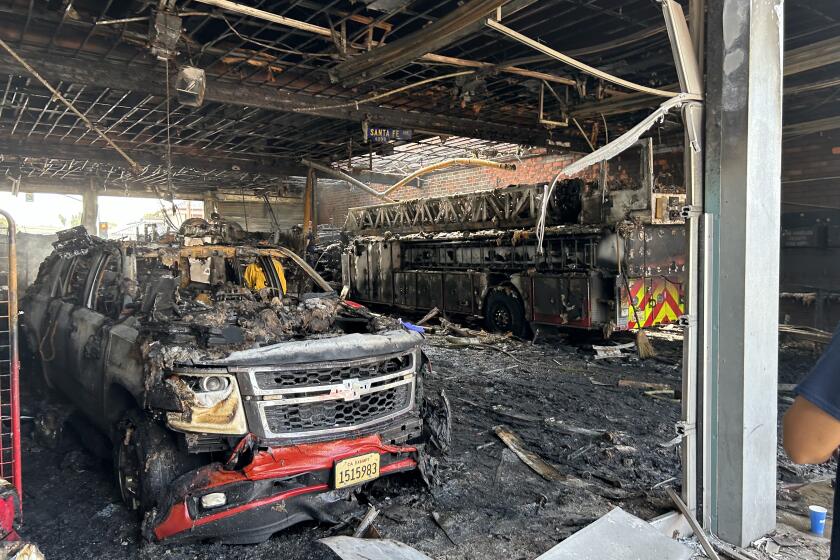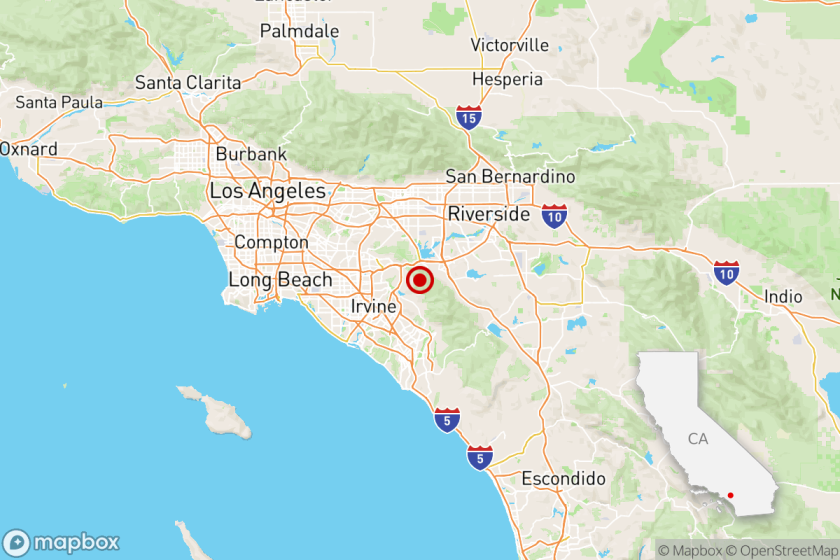2 Chumash Leaders Can’t Get Together on Powwows
Ask Richard Angulo and Paul Varela, this city’s two best-known Chumash Indian leaders, if they are feuding and both will say no.
Then consider this: Angulo, president of the California Indian Council, and Varela, director of the Chumash Interpretive Center, are busy organizing separate powwow festivals for the third weekend of this month.
At the same time. Featuring the same attractions. In the same city.
“I’ve been having a powwow every year during this week,” said Angulo, who is preparing his eighth annual event at Borchard Community Center. “Why should I change? These people, if they want to make a lot of money, they should have their powwow a different week, because my powwow is free.
“I have no animosity toward them,” he added. “I just don’t understand why they’re doing this.”
Varela, meanwhile, concedes he has little respect for Angulo, whom he dismisses as an opportunistic self-promoter of dubious Chumash ancestry--charges Angulo denies.
However, Varela stressed that he did not learn of Angulo’s powwow until he had sent out fliers and contacted vendors for his--and by then it was too late to change dates, he said.
“Ours is going to be bigger,” Varela said. “He can limp through his, and maybe next year we can do this differently.
“I’ll be honest with you, we don’t like him,” he added. “But we didn’t do this on purpose. By the time we found out about his powwow, there was no turning back.”
Disputes among Ventura County Chumash leaders are hardly a new phenomenon. They frequently center on issues of money and lineage.
For years, Chumash groups have squabbled over the important--and often profitable--task of monitoring construction sites at burial grounds and other archeological finds. Both Angulo’s California Indian Council and the Oakbrook Park Chumash Indian Corp., of which Varela is a leading member, take part in the monitoring business.
Developers are required by law to hire Native Americans as monitoring consultants at sites that are archeologically sensitive. That often leads to disputes over who is qualified to do the job--and who is of verifiable Chumash background, information most commonly drawn from the records kept by Spanish missionaries.
*
Angulo, whose lawyer has sent letters to Varela demanding he stop questioning Angulo’s lineage, claims mission records confirm his Chumash roots, so no one can question his authenticity. Nevertheless, Angulo said he disagrees with the contention that anyone who does not appear in the logs is probably faux Chumash.
“There are a lot of people who aren’t in the mission records, because not everyone took part in the missions,” Angulo said. “I don’t have time to waste on arguing things like this. This hurts all Chumash. The Chumash people preach brotherly love, and these people should practice what they preach.”
Varela and other members of the Oakbrook Chumash People are not currently recognized as a tribe by the federal government, but scholars say their genealogical lines are the most solid of any Ventura County Chumash group.
The Oakbrook Chumash are going through the cumbersome process of trying to convince the Bureau of Indian Affairs that they are indeed Native Americans--a designation that would probably result in thousands of dollars in grants and aid. To date, the only Chumash tribe recognized by the federal government is the Santa Inez Chumash, who live on a small reservation in Santa Barbara County that now operates a gambling casino.
*
Opened last year amid a stunning oak grove in Lang Ranch, the Chumash Interpretive Center’s mission is to educate young people about the Chumash way of life. Its exhibits of real and re-created Chumash tools, jewelry and art--as well as the area’s 6,000-year-old cave paintings--have proved a major hit with local schoolchildren.
But finding money to operate the nonprofit center has been a problem. The donations and grant money that support the facility have been used up faster than expected as the number of visitors has exceeded Varela’s expectations.
Varela hastily organized a pancake breakfast last month to raise some money until the powwow on Sept. 21 and 22, which will cost $6 for adults and $3 for children 6 to 12 years old.
There will also be food such as Indian fried bread and buffalo burgers, dancing and 40 vendors of Native American arts and crafts--some of whom defected from Angulo’s powwow, Varela said.
“We’re a viable organization here with a specific goal: We educate children about our people,” Varela said. “His is a self-serving organization, which as far as we can tell, is made up of Richard and his mother.
*
“We don’t think he’s one of us,” Varela added. “When I first met Richard 10 years ago, he said he was Yaqui. Now he’s Chumash. What’s he going to be next year?”
Angulo’s powwow, which will include the same attractions as Varela’s, has been a success with the public.
He said parents have thanked him for putting on the event free of charge, saying it gave them a place to take their families without spending money.
One Irish family even decided to schedule their yearly visits to relatives in Ventura County so they could attend his powwow, Angulo said.
He resents that the Chumash Interpretive Center’s lack of money has led Varela to compete against other Native Americans, he said.
“My powwow is not a fund-raiser,” Angulo said. “I enjoy letting people learn about the Indian people. That’s why I do this.
“I helped those people get that place,” he said of the Oakbrook Chumash. “But I don’t know that we have a good relationship anymore. I know they’re low on money, but I don’t think they should have a powwow the same week as mine. That doesn’t help anybody.”
More to Read
Start your day right
Sign up for Essential California for news, features and recommendations from the L.A. Times and beyond in your inbox six days a week.
You may occasionally receive promotional content from the Los Angeles Times.






